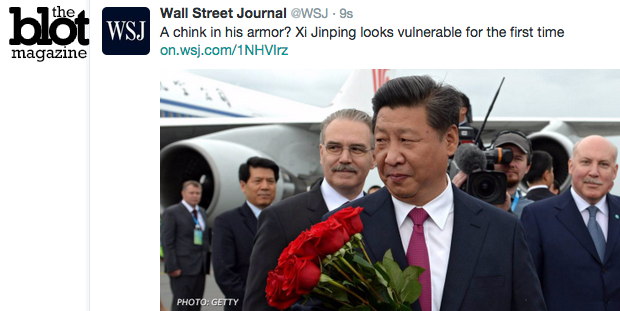
This is what The Wall Street Journal tweeted Sunday about Chinese leader Xi Jinping:
.@WSJ‘s deleted tweet about Xi Jinping & “chink in the armor” was clearly racist, not just a “common idiom.” pic.twitter.com/vWYvmwNO29
— AsianAmericanLegal (@aaldef) August 31, 2015
Racial slur or common idiom? The Wall Street Journal swiftly removed the tweet after the inevitable backlash, claiming that “no offense was intended.”
Maybe. Under different circumstances, it might have been benign. It could have been impulsive writing or yet another symptom of financially strapped newsrooms. In any case, Twitter-WSJ’s use of the word “chink” seared eyeballs already inflamed by last week’s run of Asian-bashing by Republican presidential candidates, with Jeb Bush’s “anchor baby” remarks swiftly followed by Carly Fiorina’s taking a public stance against Chinese “birth tourists.” The Donald, who has long made China his favorite target on “Fox & Friends,” returned to being loudest voice warning hapless Americans about the coming Yellow Peril, complete with his own “it’s-not-meant-to-be-
Yet earlier this year, the U.S. Army tweeted out, “Chinks in…armor poses challenges,” and professed confusion when it was called out for being “racially insensitive.” I daresay there was, in fact, nothing remotely racist about it, for the Army was referring to actual chinks — meaning cracks or vulnerabilities — in armor used by special ops, not to people of Asian descent who might be wearing said armor in combat situations.
Read more: Jimmy Kimmel’s Joke About Killing Chinese People Sparks Protests
Same words, same format — yet one version is racist, and the other isn’t. How come? Consider another example: In 2012, “chink in the armor” was used to describe basketball player Jeremy Lin. The employee who posted the headline was fired, and ESPNews anchor Max Bretos, who had asked on air, “If there is a chink in the armor, where can Lin improve his game?”— was suspended for 30 days. (Ironically, Bretos apologized by yanking out the canard, “My wife is Asian,” which, when used as a defense against accusations of racism, is all kinds of problematic.)
Read more: Racist Wall Street Journal ‘journalist’ Abigail Pesta Implicated in Fraud against Chinese American Financier
In formal English, a “chink” is a certain kind of hole in protective barriers. When hurled against people, “chink” is a racial slur. So which is it? Given that words have etymologies which are their own form of history, banning ones you dislike seems a problematic strategy. In response to a list of replacement words that website Upworthy suggested for politically incorrect terms such as “crazy,” humorist and travel writer Kirsten Koza observed that doing so makes you sound “like someone who doesn’t speak English and is relying on an online translator.” Here is one of the examples she wrote in a story for TheBlot Magazine following Upworthy’s proposed substitutions:
Not That: “This restaurant is a madhouse. I can’t find a seat anywhere, and I’m crippled after playing 36 holes of golf.”
Say This: “This restaurant is an unruly. I can’t find a seat anywhere, and I’m dismantled from playing 36 holes of golf.”
Read more: Upworthy, Your Ableist Words List Is Asinine!
Twitter’s 140-character limit leaves no room for subtlety. It evaporates context, something that most words require to accurately convey meaning. (Consider simple words such as “pot” or “drag,” which have completely different meanings depending on context.) Instead of reactionary calls to ban “offensive” words, which leads down a primrose path to doubleungoodville, why not teach kids that using racial slurs make them sound like a fool? Then get off social media and crack open a book.
Paula Lee is a contributing journalist for TheBlot Magazine.





